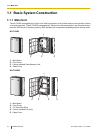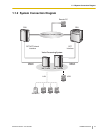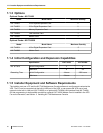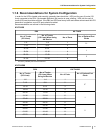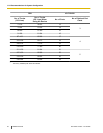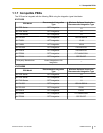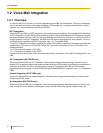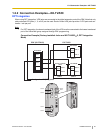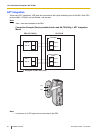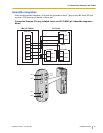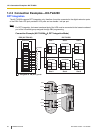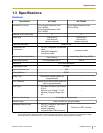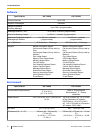
1.2 Voice Mail Integration
1.2.1 Overview
In order for the VPS to function, it must be integrated with the PBX it is connected to. The type of integration
that is used determines how voice (caller messages, VPS prompts, etc.) and data (extension status, button
presses, etc.) are sent between the VPS and the PBX.
DPT Integration
When the VPS and PBX use DPT Integration, voices and data are sent digitally. The most significant advantage
of DPT Integration is that the 2B+D communication provides 2 VPS ports for each port. DPT Integration requires
the proper software level in the PBX as well as 4-conductor connections for each jack. In order for the VPS to
function properly using DPT Integration, the PBX and VPS must be programmed to work together. For a list
of PBXs that are compatible with DPT integration, see 1.1.7 Compatible PBXs.
To use DPT Integration, the lowest numbered jack of the VPS must be connected to the lowest numbered jack
assigned as a voice mail port in the PBX. See the DPT connection example(s) for your VPS model in the
following sections:
1.2.2 Connection Examples—KX-TVA50
1.2.3 Connection Examples—KX-TVA200
Connect the other jacks to the VPS in the same order as they are found in Voice Mail Port Assignment in the
PBX.
APT Integration (KX-TVA50 only)
When the VPS and PBX use APT Integration, voices are sent using analog technology, and data is sent
digitally. APT Integration requires the proper software level in the PBX as well as 4-conductor connections for
each jack. In order for the VPS to function properly using APT Integration, the PBX and VPS must be
programmed to work together. For a list of PBXs that are compatible with APT integration, see 1.1.7 Compatible
PBXs.
Inband Integration (KX-TVA50 only)
When the VPS and PBX use Inband Integration, voices are sent using analog technology, and data is sent
using analog DTMF tones.
No Integration (KX-TVA50 only)
When the VPS and PBX use no integration, voices are sent using analog technology and data is sent to the
VPS through the use of standard audio signals, such as DTMF tones, busy signals, ringback tones, etc.
24 Installation Manual Document Version 3.0 2010/06
1.2.1 Overview





